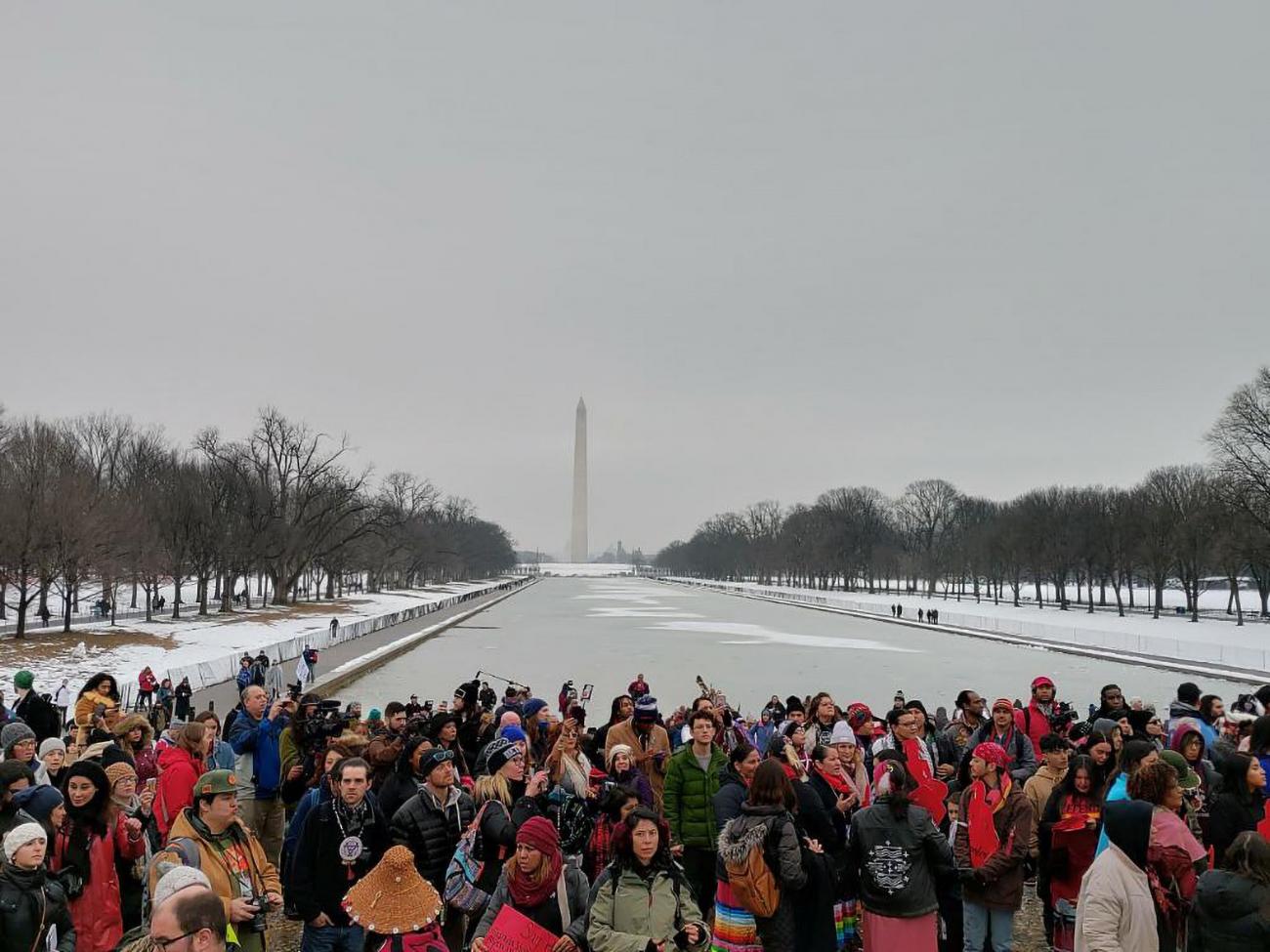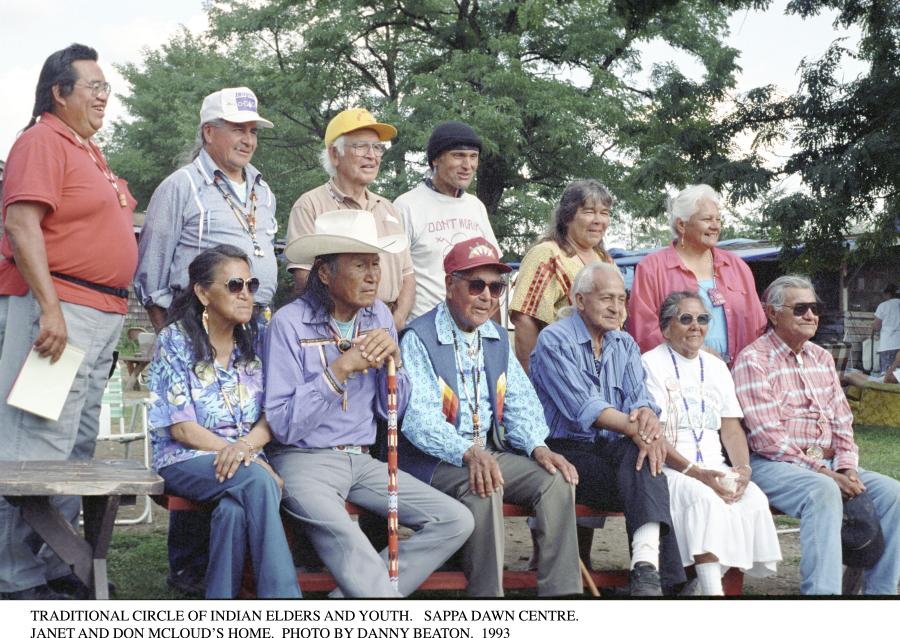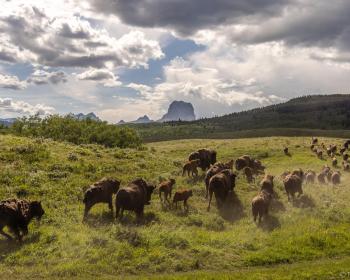
Today is Presidents Day, a day for reflecting on where Native Americans stand after two years of a Trump presidency. Since taking office, the current administration has rolled back policies that protect the rights of Indigenous Peoples and has failed to respect and honor Tribal Nations and their sovereignty.
In order to support the struggle for Indigenous rights, we must take a stand against the administration’s blatant disregard and disrespect for Indigenous communities. Learn about the ways in which we can support Indigenous Peoples when the government continually refuses to do so.
How Trump has Disrespected Native Americans and Ways Native Americans are Resisting
Using Hate Language
Trump consistently and publically uses hateful language towards Native Americans. He repeatedly references Pocahontas as a slur and makes light of an act of genocide against the Lakota people at Wounded Knee. "You have a president who constantly uses Pocahontas as a racial slur and also a denigration against the epidemic of missing and murdered indigenous women, because Pocahontas was a victim of child rape and kidnapping. Then you have the president making light and being flippantly dehumanizing and offensive about our genocide here in Lakota Country," said Chase Iron Eyes of Lakota People's Law Project on Democracy Now!.
Following Elizabeth Warren’s live Instagram Q. and A. session on January 2, 2019, Trump tweeted “If Elizabeth Warren, often referred to by me as Pocahontas, did this commercial from Bighorn or Wounded Knee instead of her kitchen, with her husband dressed in full Indian garb, it would have been a smash!” Trump received swift criticism for these highly offensive remarks. Ruth Hopkins, a Dakota/Lakota Sioux writer, biologist and Tribal attorney tweeted “+300 of my people were massacred at Wounded Knee. Most were women and children. This isn’t funny, it’s cold, callous, and just plain racist.”
Trump’s offensive language, however, predates his recent twitter spat against Elizabeth Warren. In response to Trump’s demeaning invocation of Pocahontas at an NRA address in April 2017, the National Congress of American Indians issued a statement claiming “we cannot and will not stand silent when our Native ancestors, cultures, and histories are used in a derogatory manner for political gain.” The NCAI also condemned Trump’s use of Pocahontas as a racial slur throughout his 2016 presidential campaign and laments that “the cultural misappropriation of Native American cultures and traditions unfortunately was a common occurrence during the 2016 election season.”
Reducing Bears Ears Monument
Native Tribes have advocated and fought for the protection of Bears Ears for years, resulting in it being named a national monument under the Obama administration. About one year ago, Trump approved slashing the protected Bears Ears site by 200,000 acres, and recently announced it will be opened for oil and gas bidding. This aligns with Trump’s tendency to disrespect Native history and land.
In response to this action, the Hopi Tribe, Pueblo of Zuni, and Ute Mountain Ute Tribe, represented by the Native American Rights Fund, have filed suits which are to be decided this upcoming year. However, no federal actions have been taken to halt this reduction of land.
In the latest case update on November 16, 2018, Native American Rights Fund reiterated their commitment to the preservation of Bears Ears. “NARF and the Tribes will continue to fight this presidential overreach and stand firm to protect these lands that are so tremendously significant to the people who have lived on and around them since time immemorial.”
Check out these actions you can take.
Greenlighting Pipelines Across Native Treaty Lands
In one of his first actions as President, on January 24, 2017, Trump signed an executive order that reversed the Obama legislation and advanced the construction of the fiercely-opposed Dakota Access pipeline expediting the environmental review that Trump described as an "incredibly cumbersome, long, horrible permitting process."
On February 7, 2017, Trump authorized the Army Corps of Engineers to proceed, ending the environmental impact assessment and the associated public comment period. These pipelines are a direct attack on tribal sovereignty, clean water, clean air, sacred sites. But Standing Rock has provided a legacy of commitment to Indigenous sovereignty.
On November 8, 2018, following a suit filed by the Indigenous Environmental Network and the North Coast Rivers Alliance, the Honorable Judge Morris overturned Trump’s executive order, blocking construction of the Dakota Access Pipeline on grounds that “President Trump violated federal environmental laws when his Administration claimed that the KXL Pipeline was consistent with the public interest.” IEN and NCRA celebrated this ruling as a victory in favor of Indigenous and environmental rights. Tom Goldtooth, executive Director for IEN responded to the case’s outcome stating, “This is a win for Lakota, the Oceti Sakowin and other Tribal Nations, for the water, and for the sacredness of Mother Earth. We will continue our prayers to take action to fight the Trump administration in defense of the sacred, to protect Indigenous rights, to defend our treaty territories and to advocate for the continuation of the next seven generations of life on Mother Earth free from fossil fuels.”
Cutting Federal Programs
Trump has proposed the removal of several federal assistance programs, including the Supplemental Nutrition Assistance Program (SNAP). Trump has proposed to replace SNAP, which provides monthly benefits to purchase food items, with a “food box” program which would “replace half the benefits people receive with boxed, nonperishable — i.e. not fresh — foods chosen by the government and not by the people eating them.” Decreased access to nutritious food poses a major burden on health and could lead to increased rates of Type 2 diabetes and obesity amongst Native communities reliant on SNAP.
Native Americans were also disproportionately affected by the government shutdown, which temporarily halts many federal assistance programs and federal health initiatives. Russell Begaye, president of the Navajo Nation, described the hardships inflicted upon the Navajo Peoples during the shutdown to The New York Times. He revealed in a time of heavy snowfall “roads are unplowed because federal maintenance has stopped. Many people are now trapped in their homes, unable to make the 20- or 50-mile journey to buy water, groceries and medicine.” The shutdown has also pressured several Native American clinics to close due to lack of funding.
Promoting Voter Suppression
The U.S. government has systematically targeted Indian Country with voter suppression laws to discourage political participation. Strict voter ID laws that require voters to provide federal documentation with current addresses target Native communities as reservations often do not have residential addresses.
Amidst the fervor of the 2018 midterm elections Four Directions, a Native American voting rights organization, diligently worked to combat voter suppression and increase Native American voter participation. O.J. Semans, the co-director of Four Directions and Rosebud Sioux Tribe member, collaborated with political scientists and mapping experts at California-based Claremont Graduate University in order to “bring maps to voting sites so that people can point to the location of their residence, identify a specific address, and on-hand Tribal representatives can issue them a note of confirmation on tribal letterhead.” Seman’s efforts showcase a dedicated commitment to battling what he calls "blatant voter disenfranchisement” and solidifying permanent access to voting mechanisms for Indigenous communities across the United States.
Taking Native Land out of Trust
On September 7, 2018, Tara Sweeney, the recently-appointed Assistant Secretary for Indian Affairs, issued a decision that could take the Mashpee Wampanoag land in Massachusetts out of trust. This would mark the first time Native land has been taken out of trust since the “termination era” of the 1940s-1960s in which the US government intentionally attempted to assimilate Native Americans into the broader culture. The Mashpee Wampanoag have been advocating for support for “The Mashpee Wampanoag Tribe Reservation Reaffirmation Act” reverse the decision.
Encouraging Mocking of Native People
Recently, a group of high school students mocked a Native elder who was partaking in the Indigenous Peoples March in D.C.. Trump has defended these students’ actions, tweeting that “the students of Covington have become symbols of Fake News and how evil it can be. They have captivated the attention of the world, and I know they will use it for the good – maybe even to bring people together.”
In an interview with Democracy Now! Chase Iron Eyes responds to Trump’s hateful rhetoric following the release of video footage depicting MAGA hat-wearing youth from Covington Catholic High School mocking Nathan Phillips, an elder of the Omaha tribe. "We are—according to that mythology, that worldview, we are the savage, we are the primitive, we are uncivilized, we are antithetical to progress...Our cultural mythology as Americans contemplates the genocide of American Indians, the slavery of black folks." He warns that “when he says the things he does, he gives license to young, impressionable minds.” Iron Eye’s statement highlights the danger in the nonchalance of Trump’s rhetoric.
Promoting a Racist Zero Tolerace Immigration Policy and Pushing for a Border Wall
In 2018, two Maya children died under the custody of Customs and Border Protection and one youth was killed by a Border Patrol agent. Jakelin Caal Maquin (Maya Q’eqchi’), Felipe Gomez
The proposed border wall will cross through the Tohono O’odham Nation. Tribal members are strongly opposing this measure, have organized protests, and are demanding a role in the border talks, as the wall will separate members from resources and disrupt the community’s lifeways. The Mexican side of the border is home to the Tribe's burial ground and is important to many cultural and religious traditions.
Photo: Indigenous Peoples March, Washington, D.C. Photo by Isidoro Hazbun.



